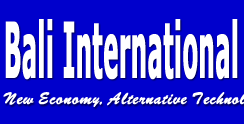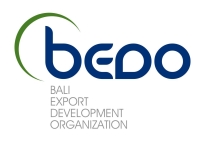SMEs are defined as:
| Small Enterprise |
With assets of < Rp 20 million (excluding land and building) |
Annual sales volume not more than Rp.1 billion |
| Medium Enterprise |
With assets > Rp 20 million (excluding land and building) but < Rp.10 billion(US$1.176 million) |
Annual sales volume is > Rp.1 billion |
|
The Role of SMEs
The Indonesia economy is basically characterized by grassroot SMEs that make up nearly 99.95 percent of the total number of enterprises. There are 41 million small economic units in the overall economy (including the agricultural sector), 60,000 medium-sized enterprises and more than 2,000 large enterprises. As of 2000, small enterprises accounted for 89 percent of total employment and medium-sized enterprises accounted for 10.55 percent. Conversely, small enterprises only accounted for 41 percent of GDP and medium enterprises 16 percent. Accordingly, the success in promoting SMEs is widely recognized as critical to long-term sustainable economic growth.
There is a need to increase the productivity of the SME sector. The productivity gap between the SME sector and large enterprises is so wide that the value added per worker in the SME sector is about 0.5 percent of that of the large enterprises on average. To make the SME-related projects more effective, the Indonesian government has chosen to dedicate itself to adopting a clustering approach with help from non-governmental organizations such as Business Development Services, members of which are spread throughout the nation.
Below is the data used as basis for monitoring changes in distribution of business by size from 1997-2000 as reported by the Central Agency for Statistics in 2003:
| Year |
Small |
Medium |
Large |
Total |
| 1997 |
39,704,661
(99.843) |
60,449
(0.152) |
2,097
(0.005) |
39,767,207
(100) |
| 1998 |
36,761689
(99.854) |
51,889
(0.141) |
1,831
(0.005) |
36,815,409
(100) |
| 1996 |
37,859,509
(99.857) |
52,114
(0.138) |
1,885
(0.005) |
37,913,608
(100) |
| 2000 |
38,669,355
(99.854) |
54,632
(0.141) |
1,973
(0.005) |
38,725,960
(100) |
| 2001 |
39,869,505
(99.850) |
57,681
(0.145) |
2,084
(0.005) |
39,929,270
(100) |
| 2002 |
41,301,263
(99.847) |
61,052
(0.148) |
2,198
(0.005) |
41,364,513
(100) |
| Annual Growth (%) |
0.80 |
0.20 |
0.96 |
0.80 |
|
DEVELOPMENT PROGRAMMES AND STRATEGIES
For the promotion of SMEs, Indonesia adopted a clustering strategy since the early 1970s, particularly in regards to technological development. Clustering is the optimal strategy for promoting SMEs since businesses are scattered throughout the Indonesian Archipelago and small businesses tend to gather according to similarities in their input, output, technology and machinery, among other factors.
The Ministry of Cooperatives and Small and Medium Enterprises was established in 1993 solely to support the development of SMEs. The involvement of the government in promoting SMEs has been assigned formally to the Ministry since Law No. 9 of 1995 for Small Enterprises was enacted. The purpose of the law is two - fold: First, to create a conductive business environment; and second, to strengthen the capacity and capability of the SMEs in order to promote them as economic actors.
To implement this objective, the government has formulated six main programs, so-called Action Plans, in promoting SMEs:
- Action plan for creating a business-conductive environment: The government takes part in formulating regulations required by SMEs.
- Action plan for market access: The government works to facilitate market access and opportunity.
- Action plan for financial access: The role of the government is divided into two areas. The government can provide a special scheme for SMEs, setting up procedures and standard requirement, and it can cooperate with financial institutions to provide financial resources for SMEs.
- Action plan for information access: This program is a part of marketing access plan, a current weak point in SME marketing. This action plan is about business networking through information technology.
- Action plan for technology and technology sharing: In this action plan, the government can assist SMEs in the field of increasing awareness to apply proper technology to the enhancement of competitiveness.
- Action plan for human resources development: Improvement of organization and management capacity is mainly focused on improving SME human resources development. According to the six action plans, the Ministry of Cooperatives and SMEs established seven deputy organizations.
The Ministry of Cooperatives and SMEs has been involved in clustering strategy for promotion of SMEs. It was found that supply-driven SME development programs led by strong government in the past few decades created dependency and in many cases the programs were hampered by frequent changes in the policy setting. Therefore, the Ministry set up the new basic principle of SME promotion through clustering: transferring SME support from being the responsibility of bureaucracy to the control of Business Development Services (BDS) over three years. No direct government involvement in the SME promotion implies that Business Development Services are a catalyst to extend outreach.
Government Agencies providing Business Support
The Ministry of Cooperatives and Small and Medium Enterprises was established in 1993 to develop and implement SME-related policies and coordinate other government bodies on matters of cooperatives and SMEs. The ministry has seven deputies established under the six Action Plans. The first deputy is in charge of statistics related to Indonesian SMEs. The fourth deputy deals with business information for SME. This business information are designed to be transmitted over the Internet. The sixth deputy takes charge of business development. Some 116,000 units within industry clusters are working under the guidance of the sixth deputy, which works to encourage the SME adoption of personal computers. Finally, the seventh deputy supports the activities of cooperatives and SMEs assessment. This deputy is also given the task for international cooperation and networking.
The Ministry of Industry and Trade has developed the Center Data and Information Services, and information provided by the ministry via its Web site encompasses the import-export industry, industry capacity, tax tariffs, information for potential investors, industry technology and industrial R&D centers.
The Ministry of Information and Communication is in charge of building the ICT infrastructure and the Bank Indonesia provides SMEs with financing funds. The Ministry of Education and Culture deals with training highly skilled workforce and induce universities to actively provide business services for small enterprises independently or in cooperation with a proximate BDS provider.
The government has introduced many models for promoting SMEs, including business incubators, business consulting clinics and technology centers. However, those sponsoring programs have not been productive and could not sustain themselves for a long time. The government then turned to supporting BDS providers to serve a certain cluster in a selected area. Under the new program, each BDS enters into a contractual partnership arrangement with the government to serve for three years; in exchange, the government provides start-up capital to a BDS provider that is paid back by servicing clusters nearby within a three-year period. The contracted BDS providers are required to attend consultation meetings with the government officers in charge at the field level and hand in a regular reports on their activities and the progress of the clusters.
The fundamental problems being faced by SMEs are the lack of funding and inaccessibility of financial institutions. SMEs, micro enterprises in particular, are often excluded from banking services. To modernize credit cooperatives that serve micro enterprises in the cluster area, the government channels a fund to the credit cooperatives through the assigned bank on a contractual basis, which is forced to train and supervise the operation of micro credit. To encourage modern financial institutions to provide services to SMEs in the cluster, the government also provides matching funds for venture capital companies in the region. Other matching funds are provided by the government to credit guarantee companies to assist SMEs in gaining access to credit from the banking sector. In addition, matching funds are provided to the Business Incubator Institution.
Technical centers in the banking office are being promoted to facilitate linking SMEs and the banking sector and the expansion of micro credit through expanding micro banking and improving non-banking financial institutions. The government promotes an entrepreneurship program through universities and other relevant institutions organized by the Ministry of National Education.
Private Sector Participation
Although the SME informatization of Indonesia is led by the government, government bodies are not equipped to cover vast regions and various types of SMEs scattered throughout the economy without support from other organizations interested in SME promotion. Of the many organizations helping promote SMEs are Business Development Services providers in Indonesia.
The BDS providers basically operate in most of the big cities and universities. There are at least three sources of funding for non-government BDS providers, namely universities, including technology and incubation centers, NGOs and international organizations, and privately funded BDS providers that have developed in many fields of business service centers. However, in less developed regions at the district level and on the outer island of Java, the absence of BDS providers is still a common phenomenon. In those areas, the government has introduced a large number of project models to support SMEs, such as business incubators in different sectors, business consulting clinics and technology centers. However, the program sponsoring the promotion of business advisory units was not always successful in being a productive regulator and facilitator of market and product development for BDS providers. In the new cluster program that the government is planning to activate shortly, each BDS forms a contractual partnership arrangement with the government to serve the cluster for three years; in exchange, government provides start-up capital to the BDS providers. The seed money is paid back in the form of servicing other clusters nearby or in other areas as agreed upon by both parties within the three-year period.
A BDS provider is the center of a business cluster of small businesses in a region, providing them with business consulting services, business and regulatory information, and information on financial funds available.
The Center for Development of SMEs (CD SMEs) is another non-government organization located all over Indonesia, though heavily concentrated in the urban areas. CD SMEs are members of an international organization that specialize in the promotion of financial SMEs, with SME financial institutions as its members.











